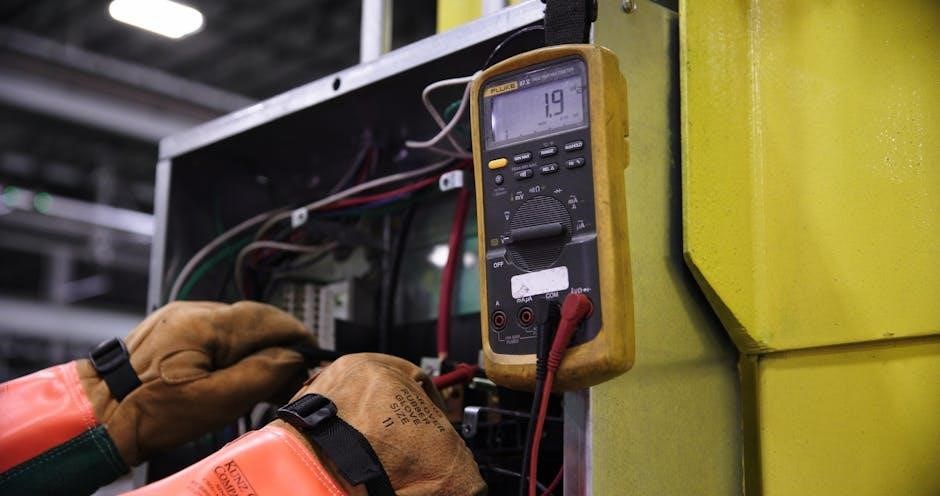Industrial maintenance ensures machinery and equipment operate efficiently, preventing downtime. Resources like “Industrial Maintenance Technician Test” offer 60+ questions covering hydraulics, PLCs, and electrical systems, aiding in knowledge assessment and skill enhancement.
Overview of Industrial Maintenance
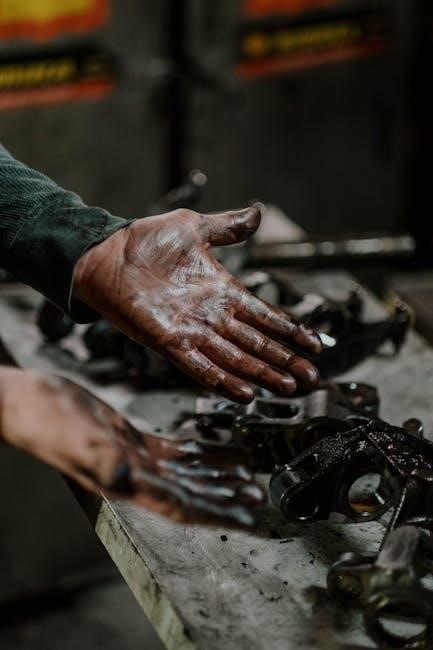
Industrial maintenance is a critical function within manufacturing and production environments, focusing on the upkeep, repair, and optimization of machinery and equipment; It encompasses various skills, including electrical, mechanical, and programmable logic controller (PLC) systems. Maintenance technicians ensure operational efficiency, reduce downtime, and improve safety standards. The role requires a strong understanding of hydraulics, pneumatics, and electrical circuits, as well as the ability to interpret technical diagrams and troubleshoot issues. With the rise of advanced technologies, predictive maintenance and IoT are becoming integral to modern practices. Training resources, such as industrial maintenance test questions and answers in PDF formats, are widely available to help technicians prepare for exams and enhance their expertise. These materials often cover topics like motor systems, bearings, and welding, making them invaluable for both newcomers and experienced professionals seeking to refine their skills and stay updated with industry standards.
Importance of Industrial Maintenance Certifications
Industrial maintenance certifications are essential for validating a technician’s expertise in maintaining and repairing industrial equipment. These certifications demonstrate proficiency in areas such as electrical systems, hydraulics, and programmable logic controllers (PLCs). Employers often require these credentials to ensure candidates possess the necessary skills to perform complex tasks safely and efficiently. Certifications also enhance job competitiveness, as they signify a commitment to professional development. Many pre-hire assessments, like those found in industrial maintenance test questions and answers PDFs, evaluate a candidate’s knowledge of mechanical and electro-mechanical systems. By obtaining certifications, technicians can reduce workplace errors, improve safety standards, and contribute to overall operational efficiency. Additionally, certifications provide a foundation for advancing in the field and adapting to emerging trends like predictive maintenance and IoT. They are a vital tool for both new and experienced professionals seeking to excel in industrial maintenance roles.

Key Topics in Industrial Maintenance Exams
Industrial maintenance exams cover essential topics like electrical circuits, hydraulics, pneumatics, and programmable logic controllers (PLCs). These subjects are critical for assessing a technician’s ability to diagnose and repair industrial systems effectively.
Electrical Systems and Circuits
Understanding electrical systems and circuits is fundamental for industrial maintenance. Technicians must identify components like resistors, capacitors, and inductors, and interpret circuit diagrams. They should also know how to measure voltage, current, and resistance using multimeters. Troubleshooting faulty circuits, understanding Ohm’s Law, and recognizing the differences between series and parallel circuits are essential skills. Additionally, knowledge of motor control circuits, including starters and contactors, is crucial for maintaining industrial machinery. These topics are often covered in pre-hire assessments and certification exams, ensuring technicians can safely and effectively work with electrical systems. Proper training and practice with these concepts are vital for success in the field.
Hydraulics and Pneumatics
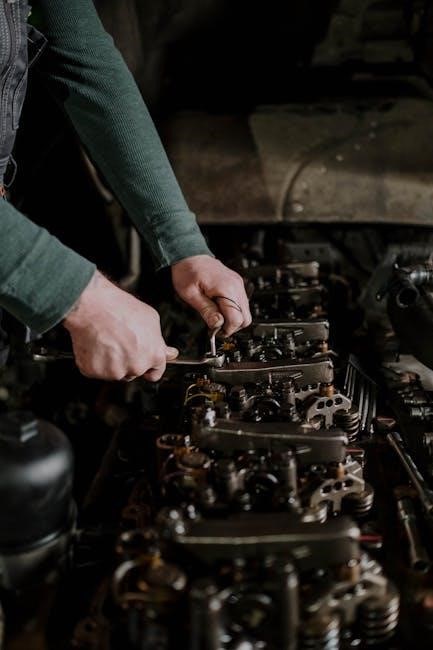
Hydraulics and pneumatics are critical components of industrial maintenance, focusing on the use of fluids and compressed air to power machinery; Technicians must understand key concepts such as fluid pressure, flow rates, and the operation of pumps, valves, and actuators. Hydraulic systems rely on incompressible fluids to transmit pressure, while pneumatics use compressed air or gas for mechanical motion. Common maintenance tasks include inspecting hydraulic hoses, checking fluid levels, and troubleshooting leaks. Understanding the differences between hydraulic and pneumatic systems is essential for diagnosing issues. Additionally, knowledge of safety protocols, such as relieving pressure before servicing, is vital. These topics are frequently covered in industrial maintenance exams, ensuring technicians can safely and effectively maintain these systems. Proper training and hands-on experience are crucial for mastering hydraulics and pneumatics in industrial settings.
Programmable Logic Controllers (PLCs)
Programmable Logic Controllers (PLCs) are integral to modern industrial automation, enabling precise control of machinery and processes. PLCs function by receiving input signals, executing programmed logic, and generating output signals to control devices. In industrial maintenance, understanding PLC operation is crucial for troubleshooting and programming. Common tasks include interpreting ladder logic diagrams, configuring I/O modules, and performing routine diagnostics. PLCs are widely used in manufacturing to automate tasks, ensuring efficiency and consistency. Maintenance technicians must grasp concepts like programming languages, communication protocols, and fault detection. Practice questions on PLCs often cover topics such as input/output configurations, timer functions, and error troubleshooting. Mastery of PLC systems is essential for maintaining and optimizing industrial processes, making it a key focus in certification exams and pre-hire assessments. Staying updated with advancements in PLC technology ensures technicians remain proficient in handling complex automation challenges.
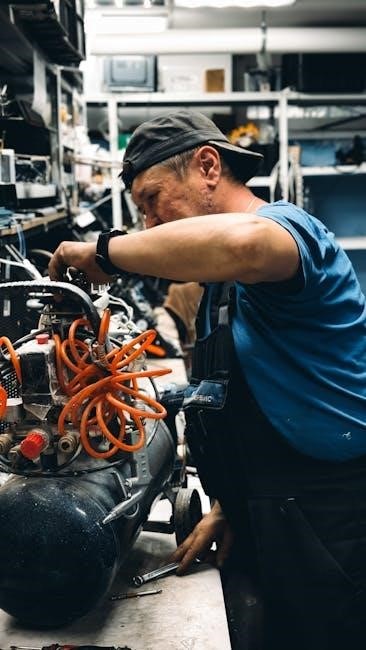
Industrial Maintenance Safety Standards
Adhering to safety standards is critical in industrial maintenance to prevent hazards and ensure compliance with regulations. Proper use of protective equipment and tools is essential for maintaining a safe working environment.

Mechanical Safety Practices
Mechanical safety practices are essential in industrial maintenance to prevent accidents and ensure equipment longevity. Proper training on tool usage and machinery operation is critical. Regular maintenance checks and adherence to lockout/tagout procedures are vital for safeguarding workers. Understanding mechanical systems, such as hydraulics and pneumatics, helps technicians identify potential hazards. Wearing personal protective equipment (PPE) like gloves and safety glasses is mandatory. Familiarity with industry standards ensures compliance and reduces risks. Employers should conduct frequent safety audits to identify and mitigate dangers. Continuous training programs keep personnel updated on best practices. Implementing these measures creates a safer work environment and minimizes downtime caused by mechanical failures. Always refer to equipment manuals for specific safety guidelines. Testing knowledge through assessments ensures technicians are prepared to handle mechanical tasks safely and effectively.

Electrical Safety Protocols
Electrical safety protocols are critical in industrial maintenance to prevent injuries and ensure efficient operations. Technicians must always de-energize systems before performing work and verify voltage levels using appropriate tools. Adhering to lockout/tagout procedures is essential to prevent accidental startups. Personal protective equipment (PPE), such as insulated gloves and safety glasses, should be worn when handling electrical components. Understanding circuit diagrams and electrical codes ensures compliance with industry standards. Regular training on electrical safety practices, like arc flash prevention, is vital. Employers should conduct frequent safety audits to identify potential hazards. Testing knowledge through assessments helps technicians apply safety protocols effectively. Familiarity with NFPA 70E standards is crucial for maintaining a safe working environment. Continuous education on emerging technologies ensures adherence to updated safety guidelines. By following these protocols, technicians can minimize risks and ensure reliable electrical system operation.

Practice Questions and Assessment Strategies
Utilize industrial maintenance test questions and answers PDFs for effective assessment strategies. These resources include pre-hire tests, covering electrical circuits, hydraulics, and PLCs, to evaluate technical skills and knowledge.
Pre-Hire Assessment Tests
Pre-hire assessment tests are essential for evaluating candidates’ technical skills in industrial maintenance. These tests typically cover a wide range of topics, including electrical circuits, hydraulics, pneumatics, and programmable logic controllers (PLCs).
Questions are designed to assess problem-solving abilities, hands-on knowledge, and the ability to interpret technical diagrams. For example, candidates may be asked to identify devices for measuring voltage or troubleshoot issues in hydraulic systems.
Such assessments help employers identify qualified candidates who can perform tasks safely and efficiently. They also reduce training time by ensuring new hires already possess foundational skills. Many resources, like industrial maintenance test questions and answers PDFs, are available to prepare for these exams. These materials often include practice questions and answers, enabling candidates to refine their expertise before taking the actual test. By streamlining the hiring process, pre-hire assessments ensure that only the most capable individuals join the workforce. This approach benefits both employers and employees by fostering a competent and reliable team.
Common Exam Questions and Answers
Common exam questions in industrial maintenance tests cover a broad range of technical topics, ensuring candidates demonstrate practical knowledge and problem-solving skills. These questions often focus on electrical systems, hydraulics, pneumatics, and programmable logic controllers (PLCs).
For instance, questions may ask candidates to identify components in electrical circuits, interpret hydraulic system diagrams, or explain the operation of PLCs. Answers are typically provided to help candidates assess their understanding and improve their skills.
Resources like industrial maintenance test questions and answers PDFs are widely used for exam preparation. They include multiple-choice questions, true/false statements, and scenario-based problems, covering topics such as motor controls, piping systems, and safety protocols.
These materials are designed to simulate real exam conditions, allowing candidates to familiarize themselves with the format and content. By practicing with these questions, candidates can identify weaknesses, refine their knowledge, and build confidence before taking the actual exam. This structured approach ensures they are well-prepared to tackle challenging questions effectively.
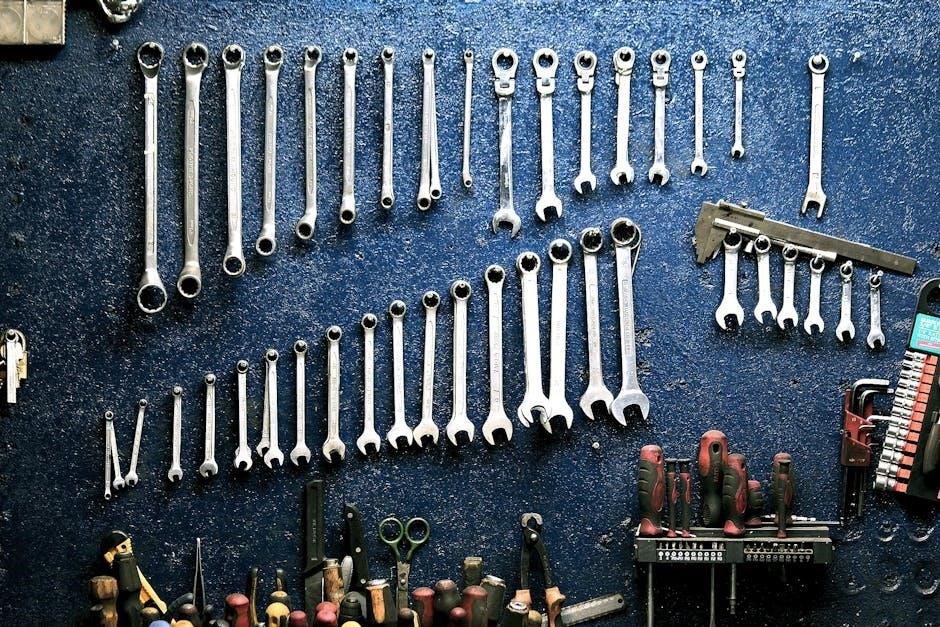
Emerging Trends in Industrial Maintenance
Predictive maintenance and IoT are revolutionizing industrial maintenance, enabling real-time monitoring and data-driven decisions. These technologies enhance efficiency, reduce downtime, and optimize resource utilization in modern industrial settings.
Predictive Maintenance and IoT
Predictive maintenance, powered by IoT, is transforming industrial maintenance by enabling real-time monitoring of equipment. Sensors collect data on performance metrics, allowing for early detection of potential failures. Machine learning algorithms analyze this data to predict when maintenance is needed, reducing unplanned downtime. IoT devices integrate seamlessly with existing systems, providing actionable insights. This approach optimizes maintenance schedules, extends equipment lifespan, and reduces operational costs. Additionally, IoT facilitates remote monitoring, enabling technicians to address issues before they escalate. However, implementing predictive maintenance requires investment in IoT infrastructure and training. Despite challenges, the benefits of increased efficiency and reliability make it a cornerstone of modern industrial maintenance strategies.
